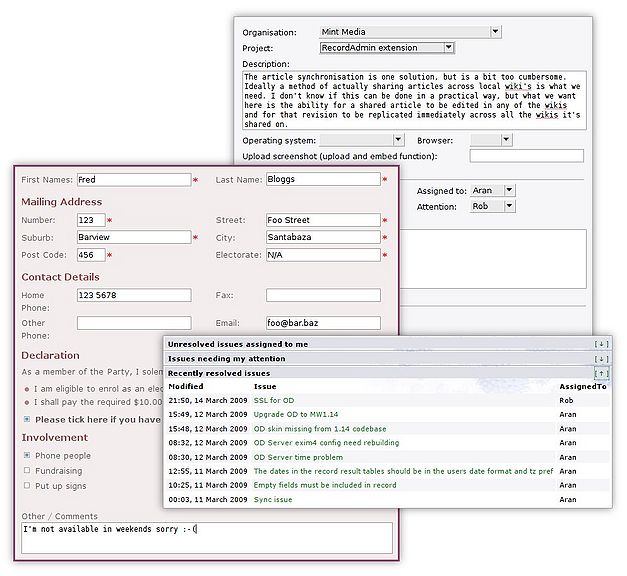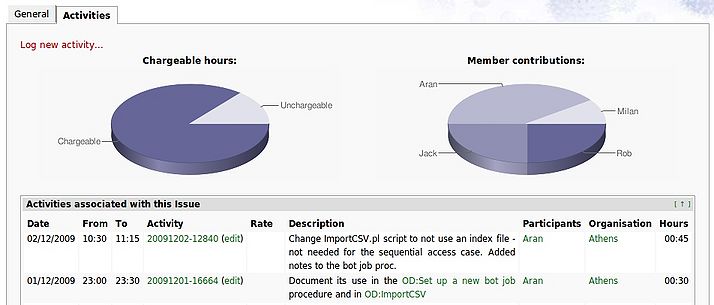Wiki Organisation
Wiki Organisation is about our vision to create an organisational framework that has specific procedures but is also generic, usable by any group working together on any mission. Wiki Organisation is a good start toward this, but the vision is not a specific technology, it is a way of working that can be encapsulated by or implemented within almost any collaborative environment. The system and its definition are continuously refined, as we use it to organise and manage our own jobs and projects. The whole system is encapsulated in an tree structure named the Organic Ontology, under which top-level aspects are called classes. We are working toward this structure's definition being such that a complete description of the system can be exported into an official ontology language such as OWL.
MediaWiki software (functionally) and projects like Wikipedia (in terms of application) exhibit a key feature where content as well as administration and organisation are described in the same collaborative environment, giving rise to a basic form of self-containment. In Wikipedia it is the actual content of articles and categories (Wikipedia: User administration, policy documentation, deletion or article improvement workflows, etc.).
The reason we chose MediaWiki is because it fulfilled our basic technical criteria, and it is also being used to run Wikipedia, which has a large and active community. The code is well-tested and under continuous development, and possesses proven scalability. We agree with the philosophy of Wikipedia's parent organisation (the Wikimedia Foundation): "Imagine a world in which every single human being can freely share in the sum of all knowledge. That's our commitment." Using MediaWiki aligns us with that philosophy and with its development momentum. There are many people familiar with the software interface, and much freely accessible content and knowledge.
Contents
Simple Wiki Organisation
Many organisations and projects are using wikis for more than just their content management needs. The wiki environment also works very well as a project management system due to it's inherent collaboration and auditing facilities. A basic wiki installation can be used for this by adopting working conventions that all of the wiki users in the organisation are familiar with and can refer to when necessary.
To be able to use a wiki in this capacity it is important that all the users take the advanced wiki training session which covers categorisation, article history, watch-lists, permissions and portals. With these skills the users can document their standard procedures and work on jobs together in accordance with a simple workflow model called the blackboard metaphor. This is how the administrators collaborate on work together for the Wikipedia online encyclopedia project which the MediaWiki software was created for.
The blackboard metaphor is a very good system for users who are scattered around the world in different time zones, speak different languages and work casually in their roles whenever they have time available. But for organisations working on an intranet together their needs are often more complex and dynamic, requiring tight schedules, records and reporting and a generally higher level of structure. This could still be done with a basic wiki installation and the blackboard metaphor, but would require extremely well defined practices and a very high level of skill from all the users. This is where our concept of "wiki organisation" enters the picture.
Advanced Wiki Organisation
At Organic Design we've been developing a "wiki organisation package" for the last few years which extends the basic wiki functionality to allow for an arbitrary level of complexity in terms of the organisational system that can be run in the wiki environment, while requiring the users to undergo only a few hours of additional training.
The wiki organisation package essentially offers the ability to have a custom made application created within the wiki environment which can even be modified by the users themselves after they've become familiar enough with it. This "collaborative application" aspect gives it a huge advantage over the standard desktop application paradigm, but on top of this, every change made to the application or any of the work being carried on within it is fully auditable and reversible since it's all part of the wiki's content which inherently comes with full history.
Even our basic installations come with all the wiki organisation extensions at no additional cost, but to have the structured content fully implemented for your organisation can take a lot of work to initially set up depending on the complexity of the aspects of your organisation you wish to model. The image below shows a few examples taken from wikis currently using the wiki organisation package.
Project management
Fundamental Records
The fundamental records in a Wiki Organisation are Person, Organisation, Project, Issue and Activity. Together these offer a basic form of project and time management. records are created for the people and organisations that your organisation deals with, and for each of the projects your organisation is involved with. These then provide a context for raising Issues and performing Activities.
These are called the fundamental records because they form the basis from which all other work can be done, including refining and expanding the system and its records.
Wiki Organisation Extensions
We include many extensions in our standard wiki installations (included in the GeneralExtensions.php file). Our organisational system is dependent on most of these for its functionality. However most of them do not need to be discussed here as they offer technical functionality such as additional magic words etc which, while important, don't contribute to the high level concepts of the system. Following is a brief description of the key extensions contributing to the wiki organisation concept.
CategoryWatch
A feature that's missing from the MediaWiki Watchlist functionality is that if you watch a category page, you will only be notified when the content of the category page text changes. You won't be notified when pages are added to or removed from that category though which is probably the main information you were wanting when deciding to watch a category page. The reason we developed the CategoryWatch extension was to allow roles to be notified when work items have changed state and been moved into a category they're responsible for.
Another feature of this extension is "auto-watched" categories. These are categories that use the naming format of Category:Automatically watched by <USERNAME> and are automatically watched by the associated user even if the user mistakenly un-watches it. One example of how we use this feature is to have categorisation links in our "Issues" template which are based on their "Assigned to" and "Needs attention from" values such that these users will be automatically notified when new issues are assigned to them, or require their attention. Before this auto-watch feature was available, the system administrator would have had to first check with all the roles to ensure they were watching the necessary categories.
DynamicPageList
A very important aspect of efficient workflow in an organisation is that the roles have access to the "portals" or "workspaces" which contain up to date information about the current work, issues, requirements, reports and other information relevant to their context. In MediaWiki, the DynamicPageList extension (usually simply referred to as "DPL") is the most common way of generating this dynamic information.
DPL is a querying and reporting mechanism for the MediaWiki environment exhibiting an extremely rich variety of options and formats from simply generating a list of articles in a category or namespace to generating complex reports based on revision properties, template usage or article content and rendered through other templates or tables.
RecordAdmin
Wiki Organisation Templates
Organisational Structure
Setting up Wiki Organisation
- Extensions
- Templates
- Sample records









